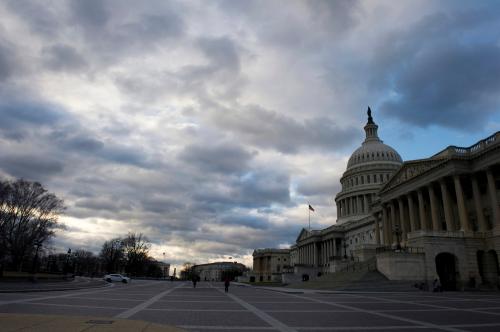“Congress has never sent [a balanced budget amendment] on to the states for ratification [and] Congress should not do so now, despite the relatively high levels of current government debt and the budget challenges that the nation faces in the future,” testified Senior Fellow Henry Aaron to the House Judiciary Committee recently.
Aaron, the Bruce and Virginia MacLaury Chair, noted five main reasons a balanced budget amendment (BBA) should neither be passed nor implemented:
- Budget deficits are sometimes beneficial, not just in times of war but also during economic slowdowns. Had there been a BBA during the recent financial crisis, he said, Congress would have needed to either taxes or cut spending that would have doubled unemployment and slashed GDP.
- Threat of political extortion by a congressional minority. Requiring a super-majority to raise the debt ceiling or to run a deficit “is a veritable summons to political extortion by an intransigent minority” and could trigger a constitutional crisis.
- Adverse impacts on Social Security and Medicare Hospital Insurance trust funds. The deficit and debt ceiling provisions of proposed legislation, Aaron explained, would prevent access to the Social Security and Medicare Hospital Insurance trust funds to sustain benefits unless there were a three-fifths majority in both Houses of Congress. A similar problem could stymie important government activities vital to combat financial panic just when they are most needed.
- Congress could still find ways around a BBA, causing more inefficient government. Congress constrained by a BBA but anxious to accomplish some agreed objective would “inevitably resort to all manner of devices that would circumvent those limits in ways that led to inefficient government” such as spending disguised as tax credits (seeming to lower both spending and revenues) or unfunded mandates. “No one interested in good and honest government should increase incentives for elected officials to find devious ways to accomplish objectives dear to them,” Aaron said.
- Legislation should be used to set policies about which people hold views that change over time. It is unwise, Aaron argued, to lock into the Constitution an economic variable of limiting government spending to 18 or 20 percent of economic output since that level may need to change based on facts and circumstances. He pointed out that just three years ago, the level of government spending in the proposed BBA was 18 percent, whereas today it is 20 percent.
Aaron urged lawmakers to look at history, noting that while President Reagan enjoyed “a well-merited reputation as a politically conservative president,” during all eight years of his presidency spending exceeded 20 percent of GDP. In addition, spending can fall below 18 percent of GDP, as it did during the last three years of the Clinton administration, partially thanks to the robust economy at that time. “The other part of the story is that during the 1990s two presidents, one Republican and one Democratic, George Herbert Walker Bush and Bill Clinton, working with Congresses that were controlled at various times by each party, produced three deficit reduction laws. All reflected bipartisan compromise.”
“This experience should teach two important lessons,” Aaron concluded.
The first is that when members of both parties work together, they can limit spending, drastically reduce deficits, and even achieve balanced budgets. The second is that if sound fiscal policy is what one wants, one doesn’t need a balanced budget amendment to get it.
Download the full testimony here. Visit the House Judiciary Committee’s website for additional hearing testimony and information.
The Brookings Institution is committed to quality, independence, and impact.
We are supported by a diverse array of funders. In line with our values and policies, each Brookings publication represents the sole views of its author(s).







Commentary
5 Reasons Why a Federal Balanced Budget Amendment Is a Bad Idea
July 28, 2014